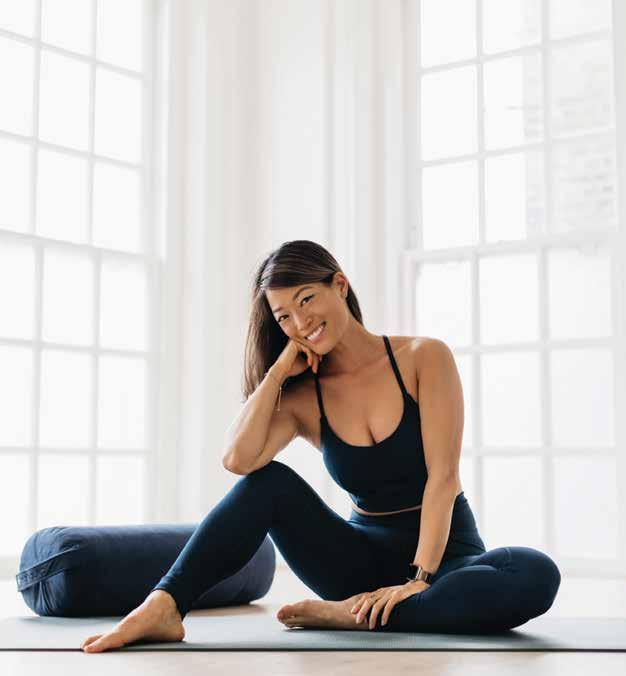
9 minute read
Optimism Prime
How To Embrace Positivity in 2021
Do yourself a favour this year and skip the unrealistic resolutions. Instead, try making small changes to foster more positivity in your day-to-day life. By Sarah Highfield
Advertisement
Arecent 2020 Hong Kong COVID-19 Health Information Survey showed that stress levels among Hongkongers have increased by 28.3 percent, while anxiety levels have grown by 42.3 percent, compared to 2016 and 2017. This seems to point to the inevitable conclusion that it has been hard to stay positive in recent times - which hardly comes as a surprise to anyone who hasn’t been living under a rock!

It can be easy to dwell on everything that went wrong in 2020 and feel nervous, anxious, or just plain negative about what 2021 will bring. But a new year is also the best time to turn over a new leaf and try something new. This year, instead of making resolutions that probably won’t stick, and might not serve you anyway (who cares if you drop a dress size!), try a little positivity! Commit to making small changes that help to keep you in a healthy headspace - no matter what life throws at you this year.

ACCEPT YO’SELF
How well do you know yourself? It might not seem immediately obvious why that matters when we talk about positivity, but it turns out there’s a very important link between the two.
A 2014 study by University of Hertfordshire found that of several “happy habits” - which included things like “giving” and “relating” - the one most strongly linked to life satisfaction was “self-acceptance”. The kicker? It’s also the habit that people tend to practice the least! Researchers theorised that people will prioritise doing things for others (such as helping others or investing in relationships) in order to feel happier, but neglect their own needs.
Mac Ling

Mac Ling is a transformational coach and the founder of Coaching Collective, an executive coaching firm based in Hong Kong. He also heads up a local men’s group, Evryman, focused on helping men with their emotional fitness. Ling works with his clients to help establish “radical authenticity,” a cognitive practice dedicated to knowing then accepting yourself entirely - the good, the bad, the ugly, even the super weird stuff!
Once someone has done the work of selfacceptance, Ling says, they’re more able to share with the world and feel fulfilled and accomplished in return.
This lines up with what researchers have also found, suggesting that if you’re searching for ways to foster more happiness and positivity in your life - the best place to start is by looking in a mirror!
TRY THIS: On a piece of paper, create two sections: one for work, and one for personal life. Divide each section into “pluses” and “minuses” then fill it out according to what you think you do well or like about yourself, as well as things you don’t do well or like about yourself. Look it over and ask yourself: do these negatives take away from all the positives on the page? Is it fair to judge a whole page by just a few minuses, or is it more accurate to look at the whole picture?
A MATTER OF PERSPECTIVE
So you’ve practiced some self-acceptance and you’re feeling pretty good, but then something terrible happens and it all goes out the window. Whether you lost your job, endured some heartbreak, or just spilled some coffee on your favourite white shirt, there’s a path to positivity in it.
Mac Ling says much of how we approach positivity and negativity is in the framing of our lives - even with something as objectively awful as COVID-19.
“Am I sad that I’m unable to take vacations this year?” says Ling. “Sure. But am I also thankful that I’ve been able to take this year of non-travel to really be present for my family? Yes!”
What Ling is referring to is actually a common element in many therapeutic models, like cognitive behavioural therapy. Reframing events, ideas, or emotions in alternative and more positive ways to our initial knee-jerk reaction can help us to accept them more easily as part of life (and we’ve already established how important acceptance is!).
Choosing to view a loss or disappointment as an opportunity for personal growth can be critical to fostering a sense of positivity, according to Ling. But he’s careful to caution that this approach doesn’t amount to repressing your emotions entirely.
“While it’s important to feel positive about your life overall, I support the need for us to find solace in the negativity, and to not deny ourselves those feelings. Healthy emotional lives mean experiencing happiness and positivity, and also sadness, anger, fear, and other negative emotions.”
What deserves our attention, according to Ling, is the need to develop the strength to process those emotions healthily, something he says many people struggle with in modern times.


TRY THIS: To reframe a negative experience, first identify it. Write it down in a circle, then ask yourself some questions about it. Things like “Is this entirely accurate?”, “Will this matter in a week?”, or “What would I say to a friend if they expressed this to me?”. Write the answers down in little bubbles linked to the main circle on the page. Once you’ve asked enough questions to give yourself some clarity, visualise a “redemptive narrative”: picture yourself telling the story of how you overcame this adversity and what positive change it produced in you!
WHEN MIND MEETS BODY
We all know there’s a connection between the mind and the body, and what affects one will ultimately influence the other. For centuries, people have practiced mind-body pursuits like yoga, tai-chi or qigong, which all serve to combine body movement, mental focus and controlled breathing. Just because it’s been around forever doesn’t mean we’ve progressed past the need for it, though.
Dominique Antiglio is a UK-based practitioner of sophrology, a self-development technique which combines meditation and breathing techniques with gentle movement and visualisation. Antiglio says she has noticed a growing public consciousness around the positive effects of mindbody work, hosting workshops for major brands like Lululemon, Soho House and Bamford. Antiglio says a mind-body practice such as sophrology helps her clients to come out of “auto-pilot,” which promotes more presence, awareness, and ultimately, positivity in their everyday life.
“Sophrology uses a simple combination of short
relaxation, breathing, movement and visualisation exercises to support everyone with stress, anxiety, sleep or confidence issues, or to find more balance and positivity in daily life.”
Not all physical activity is created equally, though. While exercise definitely plays a role in happiness, running a 10K or smashing it out at CrossFit skips that useful mindfulness we gain from slower, more meditative pursuits. So while sophrology, or tai chi or qigong for that matter, might not be your bag, it’s worth committing to some form of physical practice that encourages you to slow down, breathe, and appreciate the space your body takes up.
TRY THIS: “The Pump” is a sophrological exercise that helps relax the body by refocusing the mind on feeling sensations, oxygenating the body, and calming the nervous system. Here’s how to do it: 1. Stand tall. Exhale through the mouth, then inhale through the nose, and hold your breath. 2. Now “pump” your shoulders up and down to get the muscles moving and blood circulating again whilst simply focusing on what you feel in your body. 3. When you need to, exhale through the mouth and relax your shoulders, arms and hands and listen again for what you feel in your body. 4. Then sit down and take a moment to visualise a positive outcome in your day or your next meeting. This can help refocus your brain towards a more positive state.
Dominique Antiglio
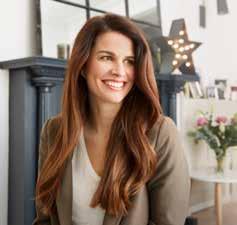

2021 Vision
New year, new mindset! Here are some ways to stop your negative self-talk in its tracks this year.
Old mindset
Feeling like a victim when things go wrong
Frustrated with work or personal failures
Fixated on the past or anxious about the future
Confusion and apprehension for the year ahead
Feeling negative about everything New mindset
Think about what you can and can’t control and shift your mindset to a different angle. Instead of saying “Why me?”, ask “OK, so what now?”.
Turn that perceived failure into an opportunity for some self-care! MindHK has webinars that are free and accessible through their website to help better manage stress. Try one out and see what skills you might pick up.
Meditation is an effective way to bring us into the present, which helps to stop obsessing over the past or future. Check out a reputable meditation centre such as Fivelements Habitat to gain some presence.
Feeling a bit lost? Seek clarity through better understanding yourself. Consider working with a transformative coach, such as those at Coaching Collective, who can work with you to identify goals and help overcome self-doubt.
We all have bad days when it’s impossible to spot a silver lining! Run yourself a hot bath, pour a glass of wine, and know that you can try again tomorrow.
JEWELS OF JAPAN
Inspired by the symbols of imperial Japan, these precious jewels make for an exquisite statement piece or even an ornate future heirloom.

The Crane Dance Brooch 18K Yellow gold with Burmese Yellow jade, Coral, Onyx, Fancy Color diamonds and White diamonds.
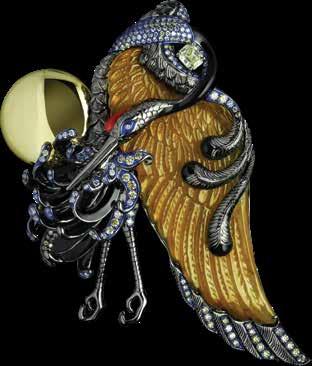
The Tsuruhime Sen no Odori Brooch I8K Yellow gold with Antique Meiji Lacquerware Hairpin, Unheated Mozambican Rubies, Motherof-Pearl, Onyx, Fancy Color Diamonds and White diamonds.
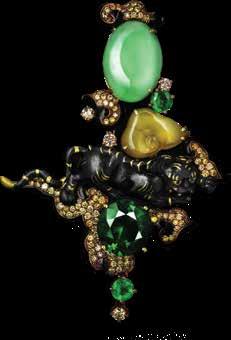
The Waghoba with Green Lunar Earrings 18K Yellow gold with Antique Edo Samurai Menuki, Brazilian Green Tourmalines, Burmese Green Jades, Colombian Emeralds, Onyx and Fancy Yellow diamonds
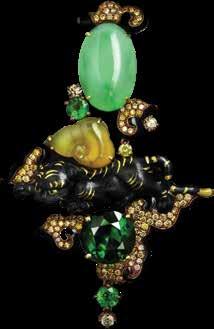
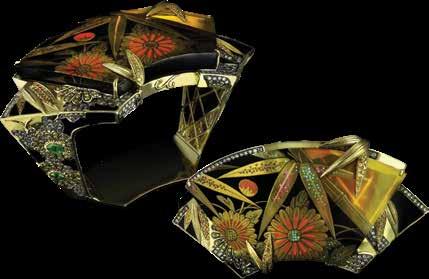
The Ōoku Bangle 18K Yellow gold with Antique Meiji Lacquered Kimono Buckle, Onyx, Fancy Orange diamonds, Fancy Yellow diamonds, Tsavorites, Champagne diamonds and White diamonds.
The Chrysanthemum Butterfly Brooch 18K Yellow gold with Burmese Imperial Green Jades, Colombian Emeralds, Champagne diamonds, Fancy Orange and Yellow diamonds, and White diamonds.


aUSTY LEE Art Jewellery
Address: Shop A, G/F, Kam On Building, 176 Queen's Road Central, Hong Kong Tel: +852 2388 0212 austy_lee










